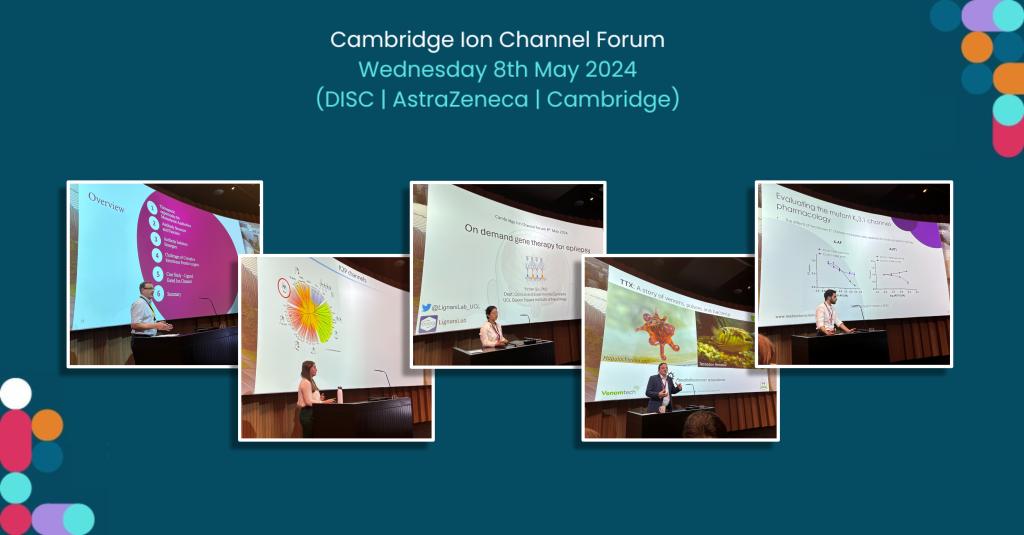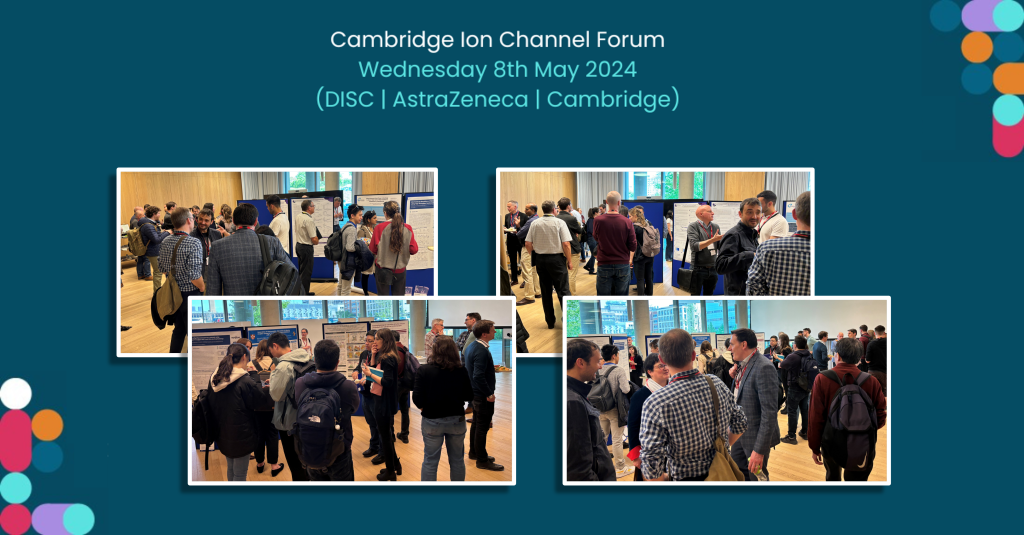This year’s Cambridge Ion Channel Forum (CICF) took place at AstraZeneca’s new world class facilities at The Discovery Centre (DISC) at the Biomedical Campus in Cambridge, UK. Upon arrival representatives from academia, biotech, pharma and contract research organisations were all catching up with old friends and making new connections, while enjoying lunch and an interesting selection of posters.
Dr Damian Bell (Sophion) chaired the first session, which focused on targeting ion channels with biologics, which is an ever-growing field. Dr Aneesh Karatt Vellatt (Maxion Therapeutics) gave the keynote speech about the proprietary platform developed by Maxion, a conjugate of an antibody and knottin, called a KnotBody. Dr Trevor Wilkinson (AstraZeneca) carried on the theme with his talk on the approach taken by AstraZeneca for the development of antibody-based therapies, explaining the different strategies that have led to a broad portfolio of targeted therapies. The session was rounded off by Kathryn Smith (University of Oxford) explaining how she used camelid-derived IgG antibodies called nanobodies to modulate K2P channels. She was able to demonstrate that single amino acid changes in the nanobodies change their function, thus elucidating the binding site of the nanobody. All three talks elicited many questions from the audience, which resulted in a lively discussion cut slightly short for coffee and cakes.
Discussions continued into the break, with plenty of time to have in depth chats with the poster presenters. By this point everyone was well into the swing of the meeting and making new connections based on their mutual interests in understanding ion channels and how to target them more effectively.
Dr Alex Pinggera (Metrion Biosciences) chaired the second session which covered gene therapies and small molecules. The first talk was by Dr Yichen Qiu (University College London) explaining a novel approach to treating the epilepsies using targeted gene therapies. Her approach of upregulating KV1.1 by reversibly targeting the gene’s promoter only in hyperexcitable cells has the potential to dramatically reduced the neuronal side effects of anticonvulsant drugs. Next Dr Steve Trim (Venomtech) gave us an insight into the fascinating world of animal derived toxins, the complexity of poisons and venoms and what we can learn from nature. His enthusiasm for the topic and extensive knowledge was infectious, as he debunked myths and demonstrated how ion channel screening techniques can be employed to pull apart the cocktail of toxins in a venom to find the molecules that could be used for future therapeutics.
The final talk of the day was from Dr Zeki Ilkan (Metrion Biosciences) who talked through how Metrion Biosciences worked with the KCNC1 Foundation to find a treatment for Eliana, who has a single mutation on her KCNC1 gene. Zeki explained how Metrion was able to develop and validate a stable cell line with this mutation and use it to test a library of drugs which could be repurposed to treat Eliana. This talk being presented at the end of the day really brought home how the work everyone does in the ion channel drug discovery field can come together to make a difference to the lives of people with diseases mediated by ion channels. Read the case study about this multi-assay high-throughput drug repurposing screen for KCNC1.
The day was rounded off with poster prizes going to Melissa Irvine (University of Cambridge) and Peter-Rory Hall (University of Oxford) before heading through to the courtyard for pizza, drinks and further ion channel discussion.
Since the meeting we’ve received fantastic feedback from those who attended, which is testament to the contribution by the presenters, delegates, and the organisers – Sophie Rose (Metrion Biosciences) and Liz Roberts (AstraZeneca).
To be notified about the date of the Cambridge Ion Channel Forum 2025 subscribe to our DisPATCHes newsletter or follow us on LinkedIn or X.


This year’s Cambridge Ion Channel Forum (CICF) took place at AstraZeneca’s new world class facilities at The Discovery Centre (DISC) at the Biomedical Campus in Cambridge, UK. Upon arrival representatives from academia, biotech, pharma and contract research organisations were all catching up with old friends and making new connections, while enjoying lunch and an interesting selection of posters.
Dr Damian Bell (Sophion) chaired the first session, which focused on targeting ion channels with biologics, which is an ever-growing field. Dr Aneesh Karatt Vellatt (Maxion Therapeutics) gave the keynote speech about the proprietary platform developed by Maxion, a conjugate of an antibody and knottin, called a KnotBody. Dr Trevor Wilkinson (AstraZeneca) carried on the theme with his talk on the approach taken by AstraZeneca for the development of antibody-based therapies, explaining the different strategies that have led to a broad portfolio of targeted therapies. The session was rounded off by Kathryn Smith (University of Oxford) explaining how she used camelid-derived IgG antibodies called nanobodies to modulate K2P channels. She was able to demonstrate that single amino acid changes in the nanobodies change their function, thus elucidating the binding site of the nanobody. All three talks elicited many questions from the audience, which resulted in a lively discussion cut slightly short for coffee and cakes.
Discussions continued into the break, with plenty of time to have in depth chats with the poster presenters. By this point everyone was well into the swing of the meeting and making new connections based on their mutual interests in understanding ion channels and how to target them more effectively.
Dr Alex Pinggera (Metrion Biosciences) chaired the second session which covered gene therapies and small molecules. The first talk was by Dr Yichen Qiu (University College London) explaining a novel approach to treating the epilepsies using targeted gene therapies. Her approach of upregulating KV1.1 by reversibly targeting the gene’s promoter only in hyperexcitable cells has the potential to dramatically reduced the neuronal side effects of anticonvulsant drugs. Next Dr Steve Trim (Venomtech) gave us an insight into the fascinating world of animal derived toxins, the complexity of poisons and venoms and what we can learn from nature. His enthusiasm for the topic and extensive knowledge was infectious, as he debunked myths and demonstrated how ion channel screening techniques can be employed to pull apart the cocktail of toxins in a venom to find the molecules that could be used for future therapeutics.
The final talk of the day was from Dr Zeki Ilkan (Metrion Biosciences) who talked through how Metrion Biosciences worked with the KCNC1 Foundation to find a treatment for Eliana, who has a single mutation on her KCNC1 gene. Zeki explained how Metrion was able to develop and validate a stable cell line with this mutation and use it to test a library of drugs which could be repurposed to treat Eliana. This talk being presented at the end of the day really brought home how the work everyone does in the ion channel drug discovery field can come together to make a difference to the lives of people with diseases mediated by ion channels. Read the case study about this multi-assay high-throughput drug repurposing screen for KCNC1.
The day was rounded off with poster prizes going to Melissa Irvine (University of Cambridge) and Peter-Rory Hall (University of Oxford) before heading through to the courtyard for pizza, drinks and further ion channel discussion.
Since the meeting we’ve received fantastic feedback from those who attended, which is testament to the contribution by the presenters, delegates, and the organisers – Sophie Rose (Metrion Biosciences) and Liz Roberts (AstraZeneca).
To be notified about the date of the Cambridge Ion Channel Forum 2025 subscribe to our DisPATCHes newsletter or follow us on LinkedIn or X.


This year’s Cambridge Ion Channel Forum (CICF) took place at AstraZeneca’s new world class facilities at The Discovery Centre (DISC) at the Biomedical Campus in Cambridge, UK. Upon arrival representatives from academia, biotech, pharma and contract research organisations were all catching up with old friends and making new connections, while enjoying lunch and an interesting selection of posters.
Dr Damian Bell (Sophion) chaired the first session, which focused on targeting ion channels with biologics, which is an ever-growing field. Dr Aneesh Karatt Vellatt (Maxion Therapeutics) gave the keynote speech about the proprietary platform developed by Maxion, a conjugate of an antibody and knottin, called a KnotBody. Dr Trevor Wilkinson (AstraZeneca) carried on the theme with his talk on the approach taken by AstraZeneca for the development of antibody-based therapies, explaining the different strategies that have led to a broad portfolio of targeted therapies. The session was rounded off by Kathryn Smith (University of Oxford) explaining how she used camelid-derived IgG antibodies called nanobodies to modulate K2P channels. She was able to demonstrate that single amino acid changes in the nanobodies change their function, thus elucidating the binding site of the nanobody. All three talks elicited many questions from the audience, which resulted in a lively discussion cut slightly short for coffee and cakes.
Discussions continued into the break, with plenty of time to have in depth chats with the poster presenters. By this point everyone was well into the swing of the meeting and making new connections based on their mutual interests in understanding ion channels and how to target them more effectively.
Dr Alex Pinggera (Metrion Biosciences) chaired the second session which covered gene therapies and small molecules. The first talk was by Dr Yichen Qiu (University College London) explaining a novel approach to treating the epilepsies using targeted gene therapies. Her approach of upregulating KV1.1 by reversibly targeting the gene’s promoter only in hyperexcitable cells has the potential to dramatically reduced the neuronal side effects of anticonvulsant drugs. Next Dr Steve Trim (Venomtech) gave us an insight into the fascinating world of animal derived toxins, the complexity of poisons and venoms and what we can learn from nature. His enthusiasm for the topic and extensive knowledge was infectious, as he debunked myths and demonstrated how ion channel screening techniques can be employed to pull apart the cocktail of toxins in a venom to find the molecules that could be used for future therapeutics.
The final talk of the day was from Dr Zeki Ilkan (Metrion Biosciences) who talked through how Metrion Biosciences worked with the KCNC1 Foundation to find a treatment for Eliana, who has a single mutation on her KCNC1 gene. Zeki explained how Metrion was able to develop and validate a stable cell line with this mutation and use it to test a library of drugs which could be repurposed to treat Eliana. This talk being presented at the end of the day really brought home how the work everyone does in the ion channel drug discovery field can come together to make a difference to the lives of people with diseases mediated by ion channels. Read the case study about this multi-assay high-throughput drug repurposing screen for KCNC1.
The day was rounded off with poster prizes going to Melissa Irvine (University of Cambridge) and Peter-Rory Hall (University of Oxford) before heading through to the courtyard for pizza, drinks and further ion channel discussion.
Since the meeting we’ve received fantastic feedback from those who attended, which is testament to the contribution by the presenters, delegates, and the organisers – Sophie Rose (Metrion Biosciences) and Liz Roberts (AstraZeneca).
To be notified about the date of the Cambridge Ion Channel Forum 2025 subscribe to our DisPATCHes newsletter or follow us on LinkedIn or X.

